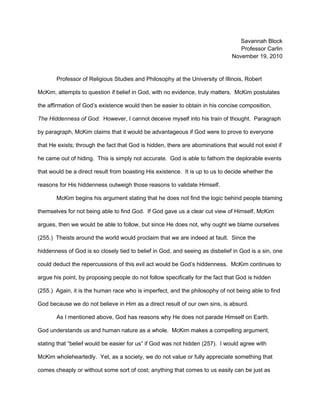
Philosophy paperii (1)
- 1. Savannah Block Professor Carlin November 19, 2010 Professor of Religious Studies and Philosophy at the University of Illinois, Robert McKim, attempts to question if belief in God, with no evidence, truly matters. McKim postulates the affirmation of God’s existence would then be easier to obtain in his concise composition, The Hiddenness of God. However, I cannot deceive myself into his train of thought. Paragraph by paragraph, McKim claims that it would be advantageous if God were to prove to everyone that He exists; through the fact that God is hidden, there are abominations that would not exist if he came out of hiding. This is simply not accurate. God is able to fathom the deplorable events that would be a direct result from boasting His existence. It is up to us to decide whether the reasons for His hiddenness outweigh those reasons to validate Himself. McKim begins his argument stating that he does not find the logic behind people blaming themselves for not being able to find God. If God gave us a clear cut view of Himself, McKim argues, then we would be able to follow, but since He does not, why ought we blame ourselves (255.) Theists around the world would proclaim that we are indeed at fault. Since the hiddenness of God is so closely tied to belief in God, and seeing as disbelief in God is a sin, one could deduct the repercussions of this evil act would be God’s hiddenness. McKim continues to argue his point, by proposing people do not follow specifically for the fact that God is hidden (255.) Again, it is the human race who is imperfect, and the philosophy of not being able to find God because we do not believe in Him as a direct result of our own sins, is absurd. As I mentioned above, God has reasons why He does not parade Himself on Earth. God understands us and human nature as a whole. McKim makes a compelling argument, stating that “belief would be easier for us” if God was not hidden (257). I would agree with McKim wholeheartedly. Yet, as a society, we do not value or fully appreciate something that comes cheaply or without some sort of cost; anything that comes to us easily can be just as
- 2. easily discarded. God desires nothing more than for people to have to search for Him and put in some type of work; this is why he knowingly conceals Himself from us. Diamonds are a great example. Why are diamonds so valuable to us? Finding these precious jewels takes effort and great cost, and in the end, there is some monetary payoff. In this case, the payoff would be finding God. Imagine what lessons would be left undiscovered if God came to our door? Attempting to find God teaches us and builds character. Nevertheless, we must take into account that we have the free will to decide whether or not we want to find God. God’s appearance would only result in taking away our ability to choose. It does not seem one is able to exercise free will when he is forced. God knows this all too well, hence the reason He gives us the ability to judge and choose which path we want to take. Just as one is not completely morally accountable for the actions he commits while a gun is pointed at his head, the act of God greeting everyone would be the proverbial gun to mankind’s head. An objector might suggest that we do indeed have free will even while the gun is pointed to our head, and therefore the ability to have free will even if God showed Himself to us. However, the person’s ability to rationally deliberate between choices would be greatly hindered; the possible threat of doing God wrong would loom literally overhead if God were on Earth, therefore one would not be able to completely utilize his freedom. Throughout his rhetoric, McKim attempts to sway readers into believing that if God exists, He would provide us with more evidence and proof of his existence. In turn, it must not matter for us to believe in God since He is hidden. Yet, when one combats this argument with our sinful nature, reasons why God must be hidden, and dire consequences for humankind if God would make himself known, McKim’s claims fall short of what we perceived them to be. Of course, this might be difficult to comprehend, but when has anything so profound been easy to explain? Why should we even begin to assume that God’s hiddenness would be described as something other than profound? Obviously, we should not assume such a bizarre concept, and take into account concepts that may nullify McKim’s ideals.
